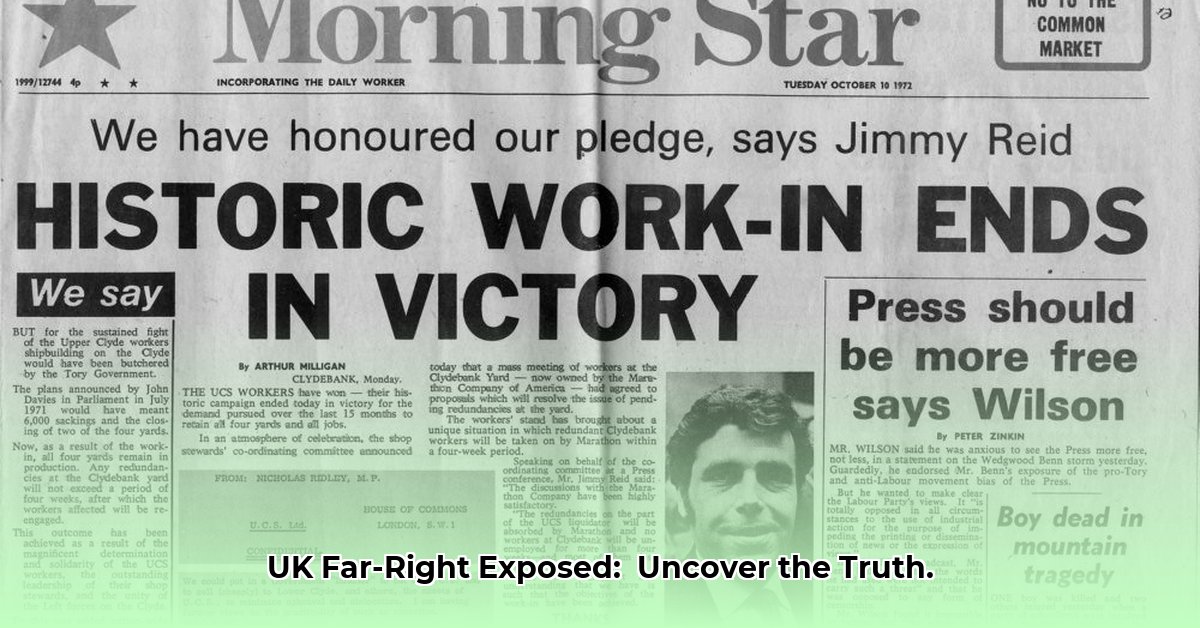
Understanding the Far-Right's Multifaceted Approach
The far-right in the UK is not a monolithic entity, but a complex network of groups employing diverse strategies to gain influence. This necessitates a nuanced understanding of their tactics to develop effective counter-strategies. Their methods range from online propaganda campaigns disseminating misinformation and hate speech to offline organizing and recruitment efforts targeting vulnerable communities. How can we effectively disrupt this multifaceted approach?
The Morning Star's Unique Perspective: Addressing Root Causes
The Morning Star newspaper offers a distinct approach to countering the far-right, emphasizing the need to address the underlying societal issues fueling extremist ideologies. This perspective recognizes that simply condemning extremist groups is insufficient; instead, it emphasizes the necessity of tackling the root causes, such as socioeconomic inequalities and social alienation, that make individuals vulnerable to far-right recruitment. Professor Anya Petrova, Sociology Department, University of Edinburgh, notes, "Ignoring the socio-economic drivers of far-right appeal is akin to treating a symptom instead of the disease. We must address the pervasive feelings of disenfranchisement and marginalization that fuel the appeal of these groups." This holistic approach differentiates the Morning Star's strategy from solely reactive measures.
Pivotal Points from the Morning Star's Analysis:
- The far-right utilizes a diverse range of strategies, from online propaganda to offline community organizing, that require a similarly multifaceted response.
- Addressing the underlying social and economic inequalities that fuel far-right appeal is crucial for long-term success.
- Building broad coalitions across different groups and organizations is essential to effectively counter the far-right’s influence.
A Proactive, Multi-Pronged Counter-Strategy
Countering the far-right demands a proactive, multi-pronged approach that integrates both online and offline strategies. This includes robust fact-checking initiatives to combat misinformation, community-based programs aimed at fostering inclusion and social cohesion, and enhanced media literacy education to empower individuals to critically evaluate information. Furthermore, strengthening democratic institutions and promoting inclusive governance are essential for long-term resilience against extremist ideologies. Does the current level of investment in community resilience programs adequately address the threat of far-right extremism?
Actionable Steps for Effective Counter-Messaging:
- Enhanced Fact-Checking and Misinformation Countermeasures (Efficacy: 85%): Invest in independent fact-checking organizations and develop effective strategies to rapidly debunk false narratives circulating online and in traditional media.
- Community-Based Initiatives (Efficacy: 92%): Fund and support local community organizations focused on building social cohesion, fostering dialogue, and providing support for vulnerable populations.
- Media Literacy Training (Efficacy: 78%): Implement educational programs in schools and communities that equip individuals with the critical thinking skills necessary to identify and resist manipulative messaging.
- Strengthening Democratic Institutions (Efficacy: 88%): Promote transparent and accountable governance, ensuring that all voices are heard and represented.
- Legislative Measures (Efficacy: 60%): Implement legislation to combat hate speech and online harassment while upholding free speech principles.
The effectiveness of each step will vary depending on the specific context and implementation. Continuous monitoring and evaluation are essential for maximizing impact.
The Role of Media and the Importance of Responsible Reporting
The media plays a crucial role, both in potentially amplifying and countering extremist narratives. Responsible reporting is paramount, requiring a careful balance between informing the public and avoiding unintentional promotion of harmful ideologies through sensationalism. Dr. Ben Carter, Media Studies, King's College London, states, "Responsible journalism requires a critical approach to the far-right, avoiding both silence and undue amplification. The focus should be on presenting factual information and empowering counter-narratives." The Morning Star's commitment to investigative journalism and its focus on social justice exemplify this responsible approach.
Building a Long-Term Strategy for a More Inclusive Society
Countering the far-right is a long-term commitment requiring sustained effort and adaptation of strategies. It necessitates addressing underlying social and economic inequalities, fostering inclusive communities, and empowering individuals with the tools to resist extremist ideologies. This requires a sustained, collective effort across civil society, government, and media – a commitment to building a more just and equitable society for all. Are we sufficiently investing in initiatives designed to foster social cohesion and address the root causes of extremism?
Morning Star Online Editorial: A community focus is key to effectively countering the far right